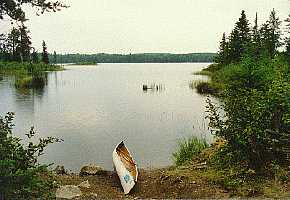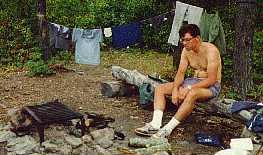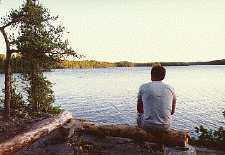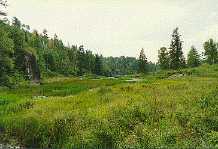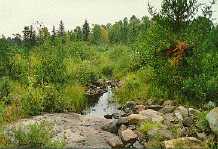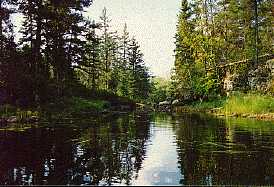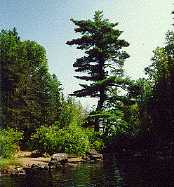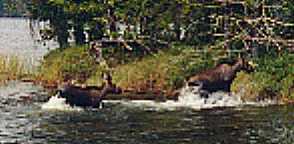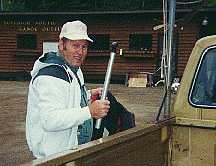Encounter on the Kawishiwi RiverA solo trip into the Superior National
Forest A loon cries out, low and mournful. Far away, another joins the lament, farther still, another. You imagine the cry carried on and on, as the wilderness goes on and on... |
With the rising sun behind me, I'm traveling swiftly across the southern waters of lake Saganaga. Sag is a big lake, and the blue-gray sky stretches high and wide to the western horizon. Below, the clear water swirls with each touch of my paddle. I check my map, then turn into Red Rock Bay. I'm heading south into the Superior National Forest. Traveling alone, I'm hoping to visit a remote region of the park, to see places that I couldn't reach with a large group of people. My supplies and gear are carefully measured and packed for a seven day trip.
My first solo trip started long ago, when I was ten years old. That was when my father took me and my brother to Northern Lights Lake in the Boundary Waters Canoe Area for a week of camping and fishing. It was on the trip home that the seed was planted. I was riding in the back of our Chevy Nomad station wagon; we were on the Gunflint trail, heading into Grand Marais. My father was in the front seat talking to Dr. Dix., one of the other dads in our group. As I watched the dust rise over the twisting gravel road, my father began talking about Janet Hansen, the woman that outfitted us with canoes, dried food and maps.
"... and at the end of the season, she loads up a canoe and disappears into the woods for a whole month!" said my dad.
My ears picked up when I heard this.
"She goes all alone?" I asked. For a boy of ten, this seemed to be an exciting adventure. It also seemed to be a little scary. I thought back to our week on Northern Lights lake. A storm came one night and blew down the Jackson's tent. My friend Mark and his dad were up in the darkness, trying to fix it in the rain and thunder. Thunder seems louder in the wilderness; it comes right through the thin material of a tent, and echoes over and over. At ten years old, I couldn't imagine being alone in a tent during a thunderstorm.
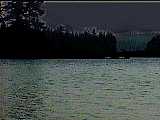 I
remember that my father taught us to make noise when we
walked through a portage, so that we wouldn't startle any
bear or moose that might be just ahead. I remember the
lonely look of the land as evening fell and the loons
started calling. There were the stories my father told us
on the trip up from Milwaukee; the time that Ray Haasch
almost drowned when he fell into the water and his rain
suit and boots dragged him down; the two people that did
drown on Vermilion lake. To travel alone was foolish and
dangerous, yet Janet Hansen did it every year!
I
remember that my father taught us to make noise when we
walked through a portage, so that we wouldn't startle any
bear or moose that might be just ahead. I remember the
lonely look of the land as evening fell and the loons
started calling. There were the stories my father told us
on the trip up from Milwaukee; the time that Ray Haasch
almost drowned when he fell into the water and his rain
suit and boots dragged him down; the two people that did
drown on Vermilion lake. To travel alone was foolish and
dangerous, yet Janet Hansen did it every year!
For years, the seed sat dormant. Ten years passed, and then I had a son of my own. Another ten years and my son Mike and I took our first canoe trip, slowly and painfully gathering the knowledge and skills that we would need in the boundary waters.
I'll never forget our first trip, a two night paddle down the Wisconsin river. In my ignorance, I made our camp on a small sand bar in the middle of the wide river. It was a hot day and it seemed like a good place to spend the night. At two o'clock in the morning, I was awakened by thunder. For the next two hours, sitting in our tent as lightning, thunder and wind crashed around us, I thought about my mistake, and hoped that it wouldn't be my last. Our metal tent poles, tied to our aluminum canoe, were the highest point for hundreds of yards around us. Mike slept through the whole storm, but I slept very little that night. The worst part was knowing that if lightning did hit us, it would not only kill me, it would kill my son too. I remember trying to think of something that I could do to get us out of danger, but of course there was nothing to do but lie in the tent and hope the storm would pass.
We survived that night, and then came six good years of summer trips to the Superior National Forest. One year we went with my brother Tom and my son's friend Mike. Then my daughter Diana and her friend Karen came along. Then Dan, Scott, Bill, Linda and Ryan joined the party. Each year our group grew and changed.
Suddenly, the year arrived when Mike had a summer job and could not go. Diana, too found work. Tom, married now, had to spend his vacation time visiting relatives in Indiana. I began to think back of that ride in the Nomad...
I land at the first portage. The landing and path are wide and worn; this part of the forest is well traveled. Three men travel in an eighteen footer, headed for Saganaga...
One of the problems I encountered in my solo trip was the resistance of my wife and family. What would happen if I got hurt? What if I got lost? I never did tell my father what I planned, and I arranged to call my wife via short wave radio each day of the trip. A few articles in the Boundary Waters Journal about solo tripping finally convinced them that I wasn't some crazy eccentric. Well, at least I wasn't crazy.
Now I'm paddling a small, lightweight solo canoe. In my packs are the radio, a small canvas tent, clothes, rain gear and enough dried food for 8 days. I take the portage to Alpine Lake and head south. The sun is well up now, and people are cooking lunch as I pass three campsites. Alpine Lake, being only one portage from Seagull Lake, is heavily traveled.
As I come up to the portage on the south end of Alpine, I encounter three canoes that block the landing. Young boys and girls are running back and forth between the canoes. A stern faced woman stands with her arms folded, while her husband works at hauling and packing. He looks up and sees me, alone, patiently waiting.
"That looks pretty good, right about now" he says. I smile back. It sure feels good too! I land the canoe and begin the short portage to Jasper Lake. There's a rushing current that follows the portage trail between the lakes. Twice in past years I led groups to Alpine Lake, but we never explored the portage. Those early trips did help me work through my mistakes in packing and navigation, but we never traveled too far. Now, traveling light and alone, I'm making excellent progress.
By three o'clock I've crossed Jasper and make my way across the short portage into Kingfisher Lake. Another short hop and I land on the portage to Ogishkemuncie. I meet three young men traveling back to Kingfisher.
"There's been some bear trouble on Ogish." The young man stops beside me as I lay down my canoe.
"Thanks for the warning. Where exactly was the bear?" I ask.
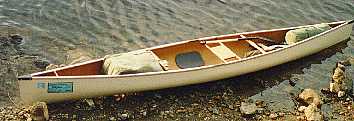 "Over
on the eastern shore." he says. I pull out my maps
and take a look. There are five campsites on the eastern
shore in the northern part of Ogish, and two on the
western shore. I should be all right if I stay on the
west. I thank the three men again and start paddling
southwest into the lake. I notice a canoe behind me as I
travel. It's late in the afternoon now, and I'm starting
to get tired. I don't want to travel farther south into
the lake, so I search for a campsite and pull up to an
empty landing.
"Over
on the eastern shore." he says. I pull out my maps
and take a look. There are five campsites on the eastern
shore in the northern part of Ogish, and two on the
western shore. I should be all right if I stay on the
west. I thank the three men again and start paddling
southwest into the lake. I notice a canoe behind me as I
travel. It's late in the afternoon now, and I'm starting
to get tired. I don't want to travel farther south into
the lake, so I search for a campsite and pull up to an
empty landing.
It's not until I start to put up camp that I realize how exhausted I am. The long drive, a restless night and the early start now catch up to me. It's still hot, and hauling my gear up to the campsite seems like a final portage that I don't want to take.
 I
unroll my hybrid rummage sale tent and look for a rock to
pound in the plastic stakes. The tent is actually two
small pup tents sewed together. One had no mosquito
screen, and both were too short. Together, they look
funny, but will give me enough shelter without adding
much weight. I don't have a gas burner, so I cut wood and
soon have a fire going. While some dehydrated beef barley
soup is cooking, I mix up some dough for bread. When the
fire burns down, I pile some coals around my small pot
and let it cook. The smell of fresh bread fills the air,
even out here in the open.
I
unroll my hybrid rummage sale tent and look for a rock to
pound in the plastic stakes. The tent is actually two
small pup tents sewed together. One had no mosquito
screen, and both were too short. Together, they look
funny, but will give me enough shelter without adding
much weight. I don't have a gas burner, so I cut wood and
soon have a fire going. While some dehydrated beef barley
soup is cooking, I mix up some dough for bread. When the
fire burns down, I pile some coals around my small pot
and let it cook. The smell of fresh bread fills the air,
even out here in the open.
An hour later, the chores are all done and there's nothing to do. I discover the down side of traveling alone. It's great when you're traveling, but not so great when you're alone in camp.
Six years of leading groups of young people spoiled me. Now I miss the joking, the questions and the cries of discovery that colored all of my previous trips. A small frog jumps out from under the log I sit on, but there's no young Diana to pick it up and show it to me. In later years I would learn how to fish, but now all I can do is turn in early.
When the sun shines, you think of the things that you see as you travel. When darkness comes, things unseen fill your thoughts. A loon cries out, low and mournful. Far away, another joins the lament, farther still, another. You imagine the cry carried on and on, as the wilderness goes on and on...
I'm up early the next morning, and begin striking camp. A few minutes later a canoe drifts toward my campsite. I say hello to my neighbors, a man from Minnesota with his young son and daughter. They're on the second day of a five day trip, and camped just north of me on the same side of the lake that I'm parked on.
"Good morning" says the man. The bow of their canoe touches the gravel shore below me. His son and daughter look up at me with curiosity. "Did you have any bear trouble last night?"
"No, I didn't." I stumble down the steep shore to the waters edge. "Some guys on the portage told me there was trouble on this lake, but they said the bear was on the eastern shore."
"Well, he must have gone swimming, because he came into our camp last night."
"Did you lose any food?" I ask.
"All of it" he says. "I was wondering if you have any extra."
I go to the tree where my food pack is hanging and bring it down. I've packed extra food for one day, and enough so that if I catch no fish at all, I'll not go hungry. I dig out enough dried stew for two meals, some rice and some cereal bars. If he catches fish, and if I catch fish, we should both be OK. I tactfully ask if he hung his food, and the answer surprises me.
"I hung it almost exactly like your pack was hung" he says. "The bear climbed the tree and got it anyway."
I realize that I've been careless in the way that I hung food, and since then I've followed the rules for how high and how far from the tree trunk and branches the food must be. Had I taken the other campsite, my trip could have been finished in one day.
I start traveling southeast and reach the steep hill on the portage into Mueller lake. I soon find out why some call it "coronary portage". Living in southern Wisconsin, in an area that's relatively flat, I've become used to getting my exercise by running at a steady pace. People that climb mountains for sport know that you must slow down to match the terrain, or you'll soon be exhausted. I don't know this yet, and on this trip, I'm still thinking that a little extra effort will smooth out my pace. I charge up the hill, and soon I'm out of breath and drenched in sweat. At times I must grab at roots and bushes to keep my balance. I load my canoe at Mueller lake and push off from the shore. It's hot now; I dip my canteen into the lake and take a deep drink.
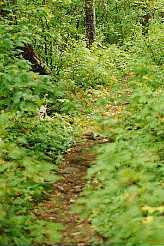 In
the middle of the next portage, between Mueller and
Agamok lake, I suddenly run into an intersecting path.
It's not as wide or well traveled as the portage. Leaves
and branches encroach; I think that walking this path
would soon leave someone soaked in the early morning dew.
I check my map at the landing and find that I've just
passed the Kekekabic Trail. This
hiking path runs from the Gunflint Trail to Kekekabic
Lake. There's something irresistible about a path into
the woods, a feeling that won't go away until you take
the walk. I know that some day I'll be back at this
crossing in the forest.
In
the middle of the next portage, between Mueller and
Agamok lake, I suddenly run into an intersecting path.
It's not as wide or well traveled as the portage. Leaves
and branches encroach; I think that walking this path
would soon leave someone soaked in the early morning dew.
I check my map at the landing and find that I've just
passed the Kekekabic Trail. This
hiking path runs from the Gunflint Trail to Kekekabic
Lake. There's something irresistible about a path into
the woods, a feeling that won't go away until you take
the walk. I know that some day I'll be back at this
crossing in the forest.
Three portages later, I enter Little Saganaga Lake. I've now done nine portages, and expect that I will see fewer people. I'm surprised to find five or six canoes on Little Sag. My maps show me later that there are other routes to this lake. It's a big lake, and with many islands and points, the fishing is probably pretty good. I carefully snake through these islands, paying close attention to my compass heading and landmarks. An hour later I'm at an island campsite with a nice southwestern exposure. I'm feeling disappointed at seeing so many people. When I first came to the boundary waters with my father back in 1962, we saw only one other party in a week of traveling. When I studied my maps for this trip, I only looked at the route I would travel, not how other people would get to where I was going. The campsites in the boundary waters are well separated, however, and when evening comes, I don't hear or see anyone else.
The next morning, despite my carefully plotted course, I misread a point of land and end up taking a longer portage out of Little Saganaga. This longer portage excites me, however. The portage trail looks more like the Kekekabic trail. It's not very wide, and not heavily traveled.
Although it's morning, I find that I'm worn out from the last three days. I slow down and begin to enjoy the walk. At the Little Sag end, the portage is swampy, but it soon rises into a nice wooded pathway. At times, the trail crosses flat, rocky areas with no soil. In my tired condition, I have to watch myself so that I don't end up walking off into the woods. In the middle of my second trip, I stop and realize that there's no other place that I would rather be. It's a perfect day. Sunlight dances on the forest floor as the trees sway and creak in the morning breeze. In each direction I see only endless wilderness; new trees grow amid the humps and fallen limbs of thirty years ago. Here is a shaded area where moss softens the rocks below. Over there is a gully that disappears into a mass of broken and fallen trees. Ahead, the portage path curves around a hillside and disappears.
I stop at a place where all the trees tops are snapped off. It's as though the wind came down with a powerful claw and swiped a chunk out of the forest. The area is small, but the destruction is complete; all of the trees are broken. I think that a tornado must have briefly touched down here.
Soon I am through the portage and travel south through Elton lake. Steep hills close in around me, and there is little wind on the water. The next portage is also narrow and less heavily travelled than the ten portages behind me. I stop on the landing of the portage into Makwa Lake and dig out a chunk of the bread that I baked the day before. The sun is gone now. The morning breeze slowly dies and gray clouds move in. A still, expectant atmosphere settles to the earth.
South of Makwa lake, the character of the land changes. The water level is low, and I walk through grass that was once swamp. Farther into the portage, the land takes on a wild, primitive look. Here is swamp land, and the trees and brush grow thick and foreboding around me. I follow a narrow path and for once am not eager to see what lies ahead. The air is still now, and only the drone of mosquitoes breaks the oppressive silence.
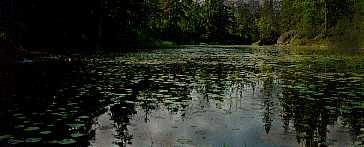 There's
an opening ahead, and I find myself on the boggy, weed
choked shore of a small pond. A rumble begins above me
and thunder echoes in the distance. My path ahead lies
through this pond. Lily pads and grass cover the surface,
and except for the small portage landing, the shores are
an unbroken wall of brush and trees. Above, the air is
thick and leaden; I'm enclosed in a dark and primitive
world, a place not for men.
There's
an opening ahead, and I find myself on the boggy, weed
choked shore of a small pond. A rumble begins above me
and thunder echoes in the distance. My path ahead lies
through this pond. Lily pads and grass cover the surface,
and except for the small portage landing, the shores are
an unbroken wall of brush and trees. Above, the air is
thick and leaden; I'm enclosed in a dark and primitive
world, a place not for men.
I drop my pack and dig out my poncho. As I return with the canoe, it starts to rain. Slowly crossing the pond, an uneasy feeling sinks down on me. This pond might be a beautiful spot on a bright, sunny day, but in the rain with thunder rumbling, it is something else. Half-remembered thoughts come into my head; childhood stories, tales from long ago when people traveled through places like this. Like an old castle, the isolated pond draws my thoughts into the past, to a time when life was hard and spirits controlled the wind, the rain and the fate of men. This place knows that although I paddle a kevlar canoe, I am no different than the thousands that have come before me. It doesn't see a modern man of logic and reason, it only sees a man that is wary, a man that can fear.
There are places like this in the canoe country, places that draw you in and control how you think and feel. You cannot be just an observer here; the mood of the land beats down on you like rain, and leads your thoughts like a narrow path leads you into dense forest. As I land my canoe on the shore of the pond, I try to shake off these thoughts and concentrate on getting to Pan lake.
My map shows two more small ponds to cross, but instead the water is gone, and I'm walking through a wide open field of grass. A small creek trickles through, but the ponds are no longer there.
I paddle through a shallow weedy channel and out into Kivaniva lake. There's a campsite here, and I stop for the night.
Late that night I dream. There is a form before me, but it does not face me. The form is talking, low and distant, but I cannot hear or cannot know the words spoken. The figure turns toward me and suddenly I know that it is not human, but something else, something malevolent. I'm filled with a sickening terror, a terror without meaning, a terror stripped of all comprehension, all thought. I don't know why I'm afraid, but I am. I jump as I wake up. Just as suddenly, I'm all right again. I know that out here, alone, I should not dwell on my fears. Outside, in the darkness, there is no sound. I turn over in my thin canvas shell and drift back into a deep sleep.
The next day brings clear skies and a gentle breeze. I'm up a little later, and don't get onto the water until nine o'clock. There's a short portage into the Kawishiwi River, and I'm soon through it. Now the wind is blowing a stiff breeze from the southwest. A weed bed at the portage landing looks promising, and I cast a red and white spoon near the shore. Strike! A medium sized northern tugs on the line. The wind pushes the canoe closer to the weedy shore, and I'm afraid that the fish will get snagged on something. I end up reaching down into the water to untangle him from the weeds, but I do get him in the boat. There won't be too many portages today, so I decide to drag the fish until suppertime. A few minutes later, at a narrowing in the river, I have a second northern and a walleye in tow. The second portage is strikingly beautiful. It has a calm, weedy landing on one side and a wide sandy beach on the other. I see bear tracks in the soil as I follow a small dried up creek that runs next to the path.
The fish I'm dragging are slowing me down. I stop for a minute to tie the mouths closed. When I look up, there is a moose walking into a marshy area on my right.
By two o'clock, I'm almost as far south as I will go on this trip. I'm out nineteen portages, in one of the most remote areas of the Superior National Forest. I must travel a few rods further, for there are pictographs here that I want to see. Traveling south out of River lake, past the portage into Alice, I haven't the foggiest idea what I'm looking for. I paddle around for about twenty minutes in the area marked on my map, but find nothing. Then, while paddling north again, I pass a massive rock face and there they are.
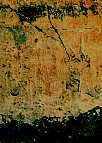
 It's two
in the afternoon, the sun is shining, and the uneasy
feeling comes back. There's a presence here that goes
beyond the drawings on the rock. Just as quickly as I
think these thoughts, I scoff at myself. I try to explain
my uneasy feeling with reason and logic. I'm tired, I had
a nightmare last night and I've never been alone before.
The reasonable part of me can't shake the feeling,
however.
It's two
in the afternoon, the sun is shining, and the uneasy
feeling comes back. There's a presence here that goes
beyond the drawings on the rock. Just as quickly as I
think these thoughts, I scoff at myself. I try to explain
my uneasy feeling with reason and logic. I'm tired, I had
a nightmare last night and I've never been alone before.
The reasonable part of me can't shake the feeling,
however.
For the first time during this trip, I realize that people actually lived here long ago. For all the years that I've visited the boundary waters, my eyes have seen mostly what it is not, not civilized, not developed, not shaped into someone else's idea of quality. On this blank wilderness canvas, I've drawn my own picture of what it is to me - a place of refuge from all of the clutter and babble of the world around it.
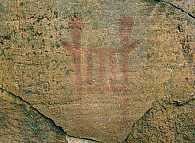 A
puff of wind walks across the river and my canoe bumps
gently against the rock face. I see now that this place
was a home, and to the people that lived here, there was
no other world. All of the comforts that I've brought in
my packs, all of the knowledge and learning and security
of the home I will go back to, all of these things did
not exist for them. These easy days of summer were only a
short respite from the cold and hunger of winter. I try
to imagine not leaving, being only here, forever.
A
puff of wind walks across the river and my canoe bumps
gently against the rock face. I see now that this place
was a home, and to the people that lived here, there was
no other world. All of the comforts that I've brought in
my packs, all of the knowledge and learning and security
of the home I will go back to, all of these things did
not exist for them. These easy days of summer were only a
short respite from the cold and hunger of winter. I try
to imagine not leaving, being only here, forever.
It is easy to imagine yourself living that life. You think that you would hunt, you would make what you needed, you would have courage to face the hardship. But when you think of your children living in such a world, it's a different story. No medicine, no hope for something better, no escape from early and frequent death. How did they keep their courage, how did they keep their fear from overwhelming them? I look east to an old campsite on the shore across from the rock face. They must have lived there for a time, long ago. I think of camping there tonight, but I know that I can't. I don't want to be alone here when night falls. I feel like an uneasy woodsman, sitting with his back to the fire, straining to see past the shadows that squirm and dance in the trees beyond the firelight. I know it's all in my head, but I can't shake the feeling. I didn't expect to encounter thoughts like these, but they hang over my head like the massive rock face next to my canoe.
I leave the pictographs and paddle slowly towards the portage to Alice lake. The portage landing is nothing more than a pile of boulders. I balance from rock to rock and load my canoe just short of where it will float in the current. An hour later I'm paddling toward a campsite on Alice lake. Here again the forest changes. The sky opens, and the land seems new and well traveled. There are pictographs shown here on my map, but I cannot find them. I know that my trip is over, and from now on I'm only coming back home.
The trip north back to big Saganaga lake goes quickly. On one portage I surprise a moose with two calves. While I scurry to drop my pack and pick up my camera, they scurry out of the water and into the forest.
On another portage grouse block my path. They don't move - they just mill around without any fear at all. I pass a giant fish that rolls over right next to my canoe on Ester lake. I take a fall on the portage out of Ester, but luck is with me and I'm not injured. I've covered seventy two miles on this trip, and crossed thirty seven portages.
I make the last portage and the long paddle back to the end of the Gunflint Trail. Earl Cypher welcomes me at his dock and loads my pack into his pickup truck. Earl owns Superior-North Canoe Outfitters, and I've always been happy with the way he treats me. I return his canoe, and say good bye. I'll be back next year.
Two years later, as I'm driving to Grand Marais after a week of canoeing with my daughter Diana and two other young people, the crankshaft of my old Ford breaks. I send a note into town with a passing truck, and soon Gene Erickson, the owner of the Grand Marais Standard service station, is loading our tired old station wagon onto his flatbed truck. I know that my wagon is beyond repair, and before we've reached the shore of Lake Superior, I've traded the car for a ride into town.
Luck is with us, and we find a room with two beds in the old wing of the East Bay Hotel. Later that evening, I wander into a small art gallery across the street. I'm immediately drawn to a print by Michael Robinson. The print illustrates an old and frightening legend. A large, vengeful spirit bird is stealing children from a canoe while the people below wave their arms helplessly. I feel uneasy as I look at this print, just as I felt uneasy on the Kawishiwi River two years before. I think, however, that now I understand this fear that all people must feel, fear for our children, fear of the unknown, fear of thoughts or spirits that come in the night when we're alone and vunerable. Living in a modern city, surrounded by people, sheltered from nature and confident in our science, we don't realize that there were places in the world where people had only their courage to turn to. Only when we leave our secure world behind, or when an artist opens a window, do we experience an echo of what once was. Nineteen portages and a thousand years away, there are places that exist, places where spirits dwell and people travel.
Copyright 1997 by James A. Hegyi
Return to
the Canoe Stories Index
http://www.canoestories.com/solo.html
